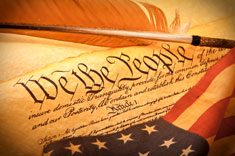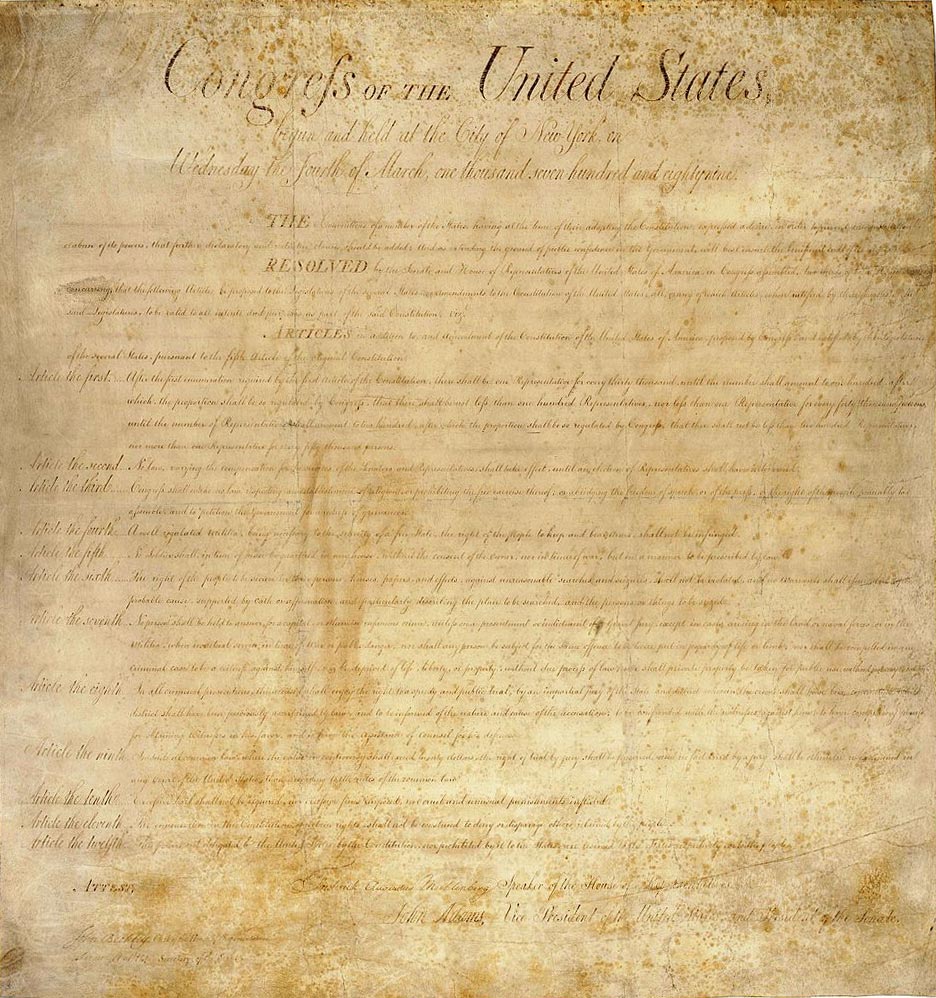| United States Constitution | |
|---|---|
 |
|
| The U.S. Constitution | |
| Preamble | |
| Articles of the Constitution | |
| I ‣ II ‣ III ‣ IV ‣ V ‣ VI ‣ VII | |
| Amendments to the Constitution | |
| Bill of Rights | |
| I ‣ II ‣ III ‣ IV ‣ V ‣ VI ‣ VII ‣ VIII ‣ IX ‣ X | |
| Additional Amendments | |
| XI ‣ XII ‣ XIII ‣ XIV ‣ XV ‣ XVI ‣ XVII ‣ XVIII ‣ XIX ‣ XX ‣ XXI ‣ XXII ‣ XXIII ‣ XXIV ‣ XXV ‣ XXVI ‣ XXVII | |
| View the Full Text | |
| Original Constitution | |
| Bill of Rights | |
| Additional Amendments |
The 7th Amendment to the United States Constitution was formulated and ratified as part of the Bill of Rights. This particular Amendment is what defines each citizen’s right to trial by jury and is among the most frequently mentioned parts of the Bill of Rights. It was designed primarily to prevent the establishment of arbitrary courts of justice, where the decision of the judges is subject to the whims and control of the government.
As one of the first 10 Amendments to the Constitution, the Seventh Amendment plays an important role in American political and legal theory. The right to trial by jury was even mentioned in the Declaration of Independence, in which the Founding Fathers decried the arbitrary courts created by the British Crown to try American merchants and traders for violating what they perceived to be unjust trade laws.
Over time however, the nature of the Seventh Amendment took on more complexity, such that it created a clear distinction between judge and jury and emphasized the difference between Private Rights and Public Rights. Even today, there are still people who argue against the efficacy of Trial by Jury and those who argue in favor of them.
Text
In Suits at common law, where the value in controversy shall exceed twenty dollars, the right of trial by jury shall be preserved, and no fact tried by a jury, shall be otherwise re-examined in any Court of the United States, than according to the rules of the common law.
The Origins
The 7th Amendment was originally ratified on December 15, 1791. However, it originated in England in the 12th century. Back then juries were composed of 12 local men who were brought in to give their opinions about a particular case. Although originally used as accusers against those who were deemed enemies of the king, the jury eventually evolved into a system where the twelve men would declare a verdict based on evidence as opposed to political expediency.
This practice eventually spread to the American colonies, where juries became one of the leading institutions where colonists expressed their discontent against the British crown. This discontent came primarily from the Navigation Act and the economic restrictions imposed upon the colonies by the Crown.
As the British government imposed more and more trade controls on the American colonies, the colonists were forced to turn to smuggling. Those who were caught were often subjected to trial by jury, where sympathetic jurors would acquit their fellow colonist of any wrongdoing, even though they violated British law.
Naturally, this angered the British King, who then created new courts which did not allow juries. This, of course, outraged the colonists, who considered such decisions by the King as being against the traditions of English law, and infringements on their rights as citizens of the British Empire.
After the War for Independence, the Seventh Amendment became one of the first ten Amendments to the Constitution enacted by the first Congress and was designed in such a way as to limit the powers of both the Federal Government as well as the Judicial Branch.
The Purpose
The Seventh Amendment guarantees the right of the accused to a jury trial in certain civil cases, and states that such trials are not subject to re-examination by other courts. However, the importance of this amendment goes beyond its most obvious characteristics and extends to other areas of American Jurisprudence.
Among the key functions of the 7th Amendment is the clear distinction between judge and jury. This distinction is expressed in terms of functions. It designates the judge as the trier of the law, whereas juries are triers of fact. This distinction between fact and law is important because it gives legitimacy to the verdict of juries, while at same time, preventing them from violating the justified legal expectations of the plaintiffs.
In other words, the 7th Amendment not only guarantees the existence of juries, but also sets the limits of its duties and responsibilities. What this means is that the law must always be taken into account whenever a jury makes a verdict. This was the original intention of those who framed the Bill of Rights. They wanted a system where the defendant’s right to have a trial by jury is protected without abrogating the plaintiff’s right to be protected by law.
So the way this works out is that the judge determines which laws apply to which case, while the juries determine the facts of each case. In every trial by jury, the judge is given the duty to determine which evidence is admissible in court, instructing the jurors about the nature of laws involved and maintaining a certain degree of balance between the plaintiff and the defendant. As for the jury, they are in charge of determining the facts of the case and what the legal consequences are for the involved parties.
